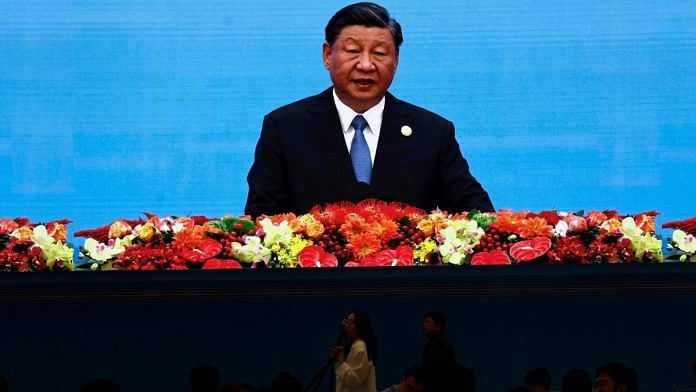Tailored for the domestic audience, Chinese President Xi Jinping delivered a concise New Year’s Eve Message. His speech underscored a medley of achievements from the year gone by, encompassing both realistic accomplishments and potentially embellished claims. Despite China’s mishandling of the Covid-19 pandemic and the subsequent decline in economic growth, Xi commenced his address by commending the country’s management of and smooth transition from the Covid-19 situation, asserting that the Chinese economy has sustained a trajectory of recovery.
Laden with optimism for the future and China’s continued accomplishments and centrality, Xi’s message aligns with his efforts to depict that his actions and leadership benefit his country.
It offers insights into China’s anticipated trajectory for 2024, which encompasses both domestic and foreign policy arenas.
https://www.youtube.com/watch?v=VUUF2EvNoRE
A ‘responsible’ major power
The rivalry between China and the United States pervaded through 2023, dictating global discussions and strategic considerations. A profound realisation resurfaced; that the competition between the two nations plays an intrinsic and definitive role in shaping the geopolitical landscape.
Middle and smaller powers found themselves compelled to chart an independent course last year, strategically opting for multi-alignment to deftly manoeuvre the intricate web of international relations. This conspicuous shift notably benefitted China. While the West grappled with uncertainty in formulating a collective response to the challenges posed by Beijing, most countries in the Indo-Pacific region actively chose to engage with the country, a trend likely to persist in 2024.
As the new year begins against a disquieting backdrop, the above scenario becomes increasingly probable. We are in the middle of two major wars that show no signs of abating, intensifying consistently due to the West’s involvement. The global landscape continues to evolve rapidly, with China strategically positioned at the core of these transformations, firmly establishing itself as a pivotal player in contemporary developments.
This sentiment was underscored in Xi’s address, where he referred to China as a “great nation with a rich civilisation” and emphasised its role as a responsible major power. During the Central Conference on Work Relating to Foreign Affairs held in Beijing on 27-28 December, Xi stressed the necessity of China shouldering responsibilities as a major country.
Despite such rhetoric, Xi exclusively referenced the China-led and dominated China-Central Asia Summit and the third Belt and Road Forum, glaringly omitting any acknowledgement of Beijing’s projected role as a peace broker. No mention of the South China Sea and the escalating China-US rivalry raises doubts about the responsible stakeholder image that Beijing is trying to portray.
Also read: China wants to divide, rule, conquer Europe. EU is too confused to stop it
Echoing stance on Taiwan
Xi reiterated his stance on Taiwan in customary fashion, emphasising that “China will surely be reunified, and all Chinese on both sides of the Taiwan Strait should be bound by a common sense of purpose and share in the glory of the rejuvenation of the Chinese nation.” Xi’s message was also echoed by Song Tao, head of China’s Taiwan Affairs Office, on 2 January. “Taiwan’s people should promote cross-strait relations to return to the right track of peaceful development, and promote the process of peaceful reunification of the motherland,” he said.
While not a novel statement, its timing, right before Taiwan’s elections, accentuates its immediate significance and potential sway over voting patterns. Equally intriguing is its correlation with mentions of Hong Kong and Macau, indicating that China is resolute about adopting a Hong Kong-like ‘One Country, Two Systems’ model for Taiwan. This approach is one that Taiwan and a majority of its people reject, thanks to the visible erosion of democracy in Hong Kong.
This divergence amplifies Taiwan’s distance from embracing the Hong Kong model and conforming to China’s expectations.
Also read: Biden’s focus was on Xi’s car, character. It shows the limits of success in US-China ties
What will Xi do in 2024?
China marks crucial anniversaries in 2024 – the 75th anniversary of the establishment of the People’s Republic and the 25th anniversary of Macau’s handover. Despite efforts to project triumph and dominance, the country grapples with internal challenges and strained international relations.
Discontent, especially regarding Xi due to extensive purges last year, persists. But the trending Weibo hashtag #2024我们将共同见证, translating to “in 2024, we will witness together,” prominently used by state-owned media accounts, reflects efforts to instil confidence about the country’s future. It hopes to shape the narrative that, under Xi’s leadership, China is destined for growth, success, and dominance.
In his address, Xi focused on highlighting accomplishments and outlining future trajectories while also acknowledging people’s struggles with job security and basic needs, compounded by natural calamities. Looking ahead, it seems economic stabilisation might take precedence, yet the pronounced downturn prompts a potential shift in focus to divert attention from domestic issues. Key events such as the Taiwan elections, tensions in the South China Sea, and the persistent China-US rivalry offer avenues for Xi to bolster his legitimacy both within the party and among the populace.
Sana Hashmi, PhD, is a fellow at the Taiwan-Asia Exchange Foundation and George HW Bush Foundation for US-China Relations. She tweets @sanahashmi1. Views are personal.
(Edited by Zoya Bhatti)



